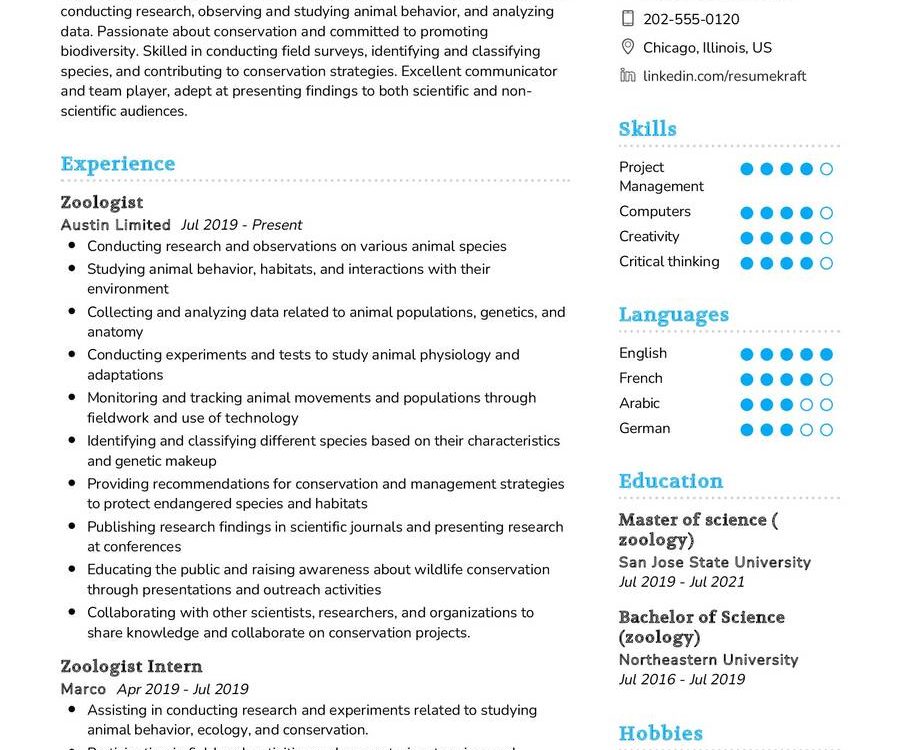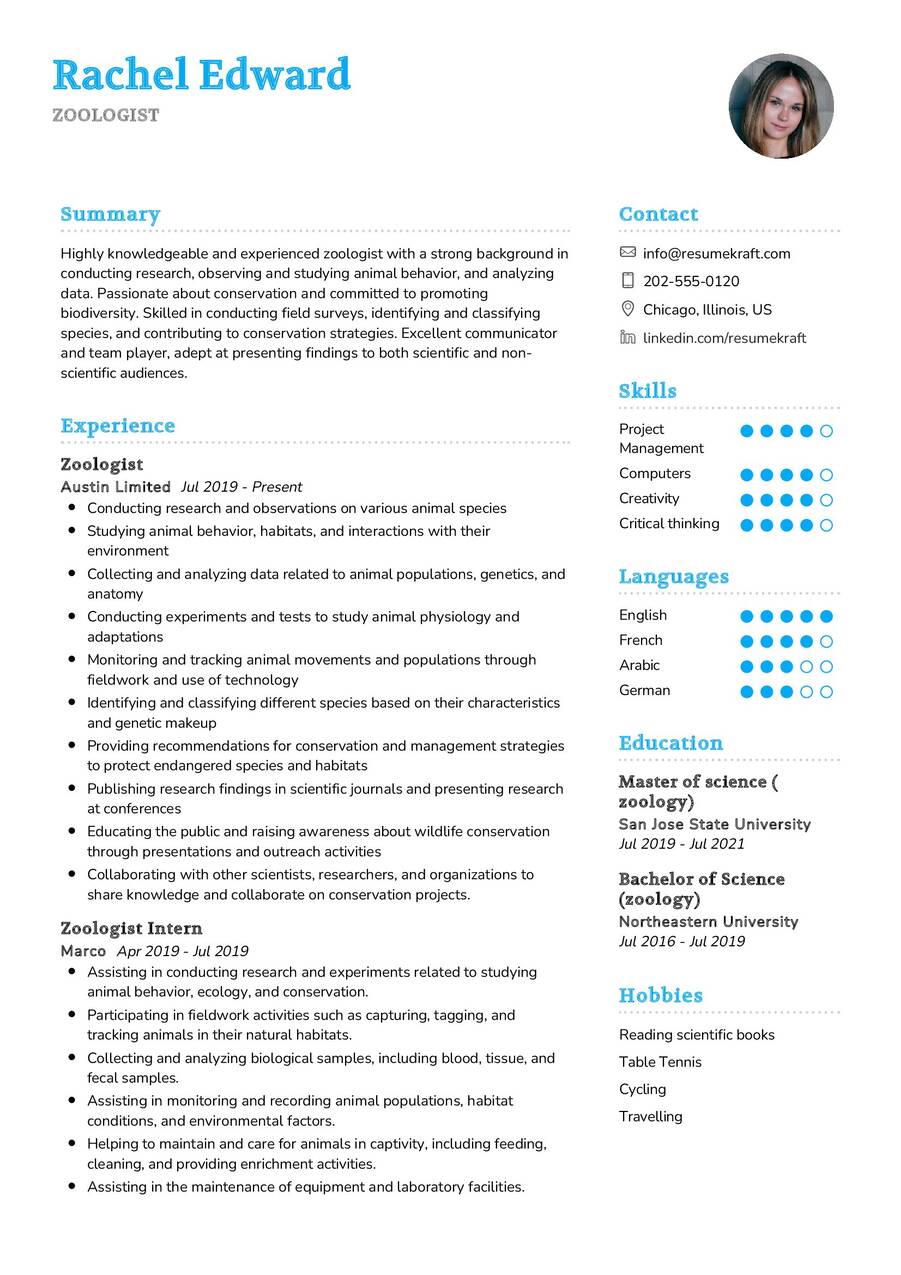Exploring the World of Zoology: The Role of a Zoologist
As the field of zoology continues to captivate those with a passion for the animal kingdom, the role of a Zoologist becomes increasingly pivotal in understanding and preserving our planet’s diverse ecosystems. This article delves into the multifaceted role of a Zoologist, combining scientific expertise with a deep appreciation for wildlife. Let’s uncover the responsibilities, job requirements, and essential skills that define this exciting profession.
What Does it Take to Become a Zoologist?
The journey to becoming a Zoologist is an adventurous exploration of the natural world. It requires a unique blend of academic qualifications, hands-on experience, and a genuine love for animals. Let’s delve deeper into the prerequisites that one needs to fulfill to embrace the role of a Zoologist:
- A Bachelor’s or Master’s degree in Zoology, Biology, or a related field, providing a solid foundation in the biological sciences.
- Specialized knowledge of animal behavior, physiology, and ecology, gained through coursework and practical field experience.
- Hands-on experience with research methodologies, including field surveys, data collection, and laboratory analysis.
- Strong analytical and problem-solving skills, essential for interpreting complex data related to animal behavior and ecosystems.
- Effective communication skills to convey research findings, write scientific papers, and engage with the public through educational programs.
- Adaptability and resilience, crucial qualities for fieldwork in diverse environments and challenging conditions.
Acquiring additional certifications in wildlife conservation or related areas can enhance your profile in the competitive job market.
Responsibilities of a Zoologist
The role of a Zoologist is a fascinating journey into the lives of animals, involving a range of responsibilities that contribute to our understanding of biodiversity. Let’s explore the core responsibilities that define this role:
- Conducting field research to observe and collect data on animal behavior, population dynamics, and ecological interactions.
- Contributing to conservation efforts by studying endangered species, identifying threats to their habitats, and developing strategies for protection.
- Collaborating with other scientists, environmentalists, and policymakers to implement conservation initiatives and address environmental challenges.
- Teaching and educating the public through workshops, lectures, and educational programs to raise awareness about wildlife conservation.
- Writing research papers, articles, and reports to share findings with the scientific community and the general public.
- Utilizing advanced technologies such as GPS tracking and remote sensing to monitor animal movements and study ecosystems.
Each responsibility is a chapter in the Zoologist’s quest to unravel the mysteries of the animal kingdom.
Zoologist CV Writing Tips
Crafting a compelling CV is essential to showcase your qualifications and experiences as a Zoologist. Here are some tips to create a CV that stands out:
- Highlight your fieldwork experience, emphasizing specific research projects and their impact on conservation efforts.
- Include details about your academic achievements, such as thesis topics, publications, or presentations at scientific conferences.
- Showcase any leadership roles in research teams or involvement in community outreach programs.
- Quantify your achievements where possible, such as the number of species studied, successful conservation projects, or educational outreach reach.
- Tailor your CV for specific job applications, emphasizing relevant skills and experiences based on the position requirements.
Your CV is your passport to the world of zoology, narrating your journey and expertise in the field.
Zoologist CV Summary Examples
Your CV summary is the opening chapter of your career story, providing a snapshot of your skills and contributions as a Zoologist. Here are some examples to inspire you:
- “Passionate Zoologist with a Master’s in Zoology and five years of field research experience. Specialized in the conservation of endangered species, with a proven track record of implementing successful protection strategies.”
- “Dedicated Zoologist with a Bachelor’s in Biology and expertise in studying animal behavior. A strong advocate for wildlife conservation, skilled in translating research findings into actionable conservation measures.”
- “Experienced Zoologist with a background in ecological research and habitat conservation. Proficient in utilizing cutting-edge technologies for wildlife monitoring and committed to fostering public awareness of environmental issues.”
Each summary is a window into your passion for zoology, your expertise, and your commitment to conservation.
Building a Robust Experience Section for Your Zoologist CV
Your experience section is the heart of your Zoologist CV, detailing the rich tapestry of your fieldwork, research, and contributions to wildlife conservation. Here are some examples to guide you:
- “Led a research team in the Amazon rainforest, studying the behavior of rare bird species. Published findings contributed to the development of a protected area for endangered birds.”
- “Designed and implemented a community-based conservation program, involving local residents in monitoring and protecting a critical sea turtle nesting site. Resulted in a significant increase in turtle hatchling survival rates.”
- “Collaborated with a multidisciplinary team to assess the impact of climate change on Arctic fox populations. Presented research at international conferences, influencing policies for Arctic conservation.”
Each experience is a testament to your dedication, expertise, and impact as a Zoologist.
Zoologist Education Section for Your CV
Your educational journey is the foundation upon which your career as a Zoologist stands. Here’s how you can present your educational milestones:
- Master of Science in Zoology, XYZ University, a journey of in-depth research and specialization, 2018.
- Bachelor of Science in Biology, ABC University, laying the groundwork for your career in zoology, 2014.
- Certification in Wildlife Conservation, Wildlife Institute, 2019.
Each educational qualification is a stepping stone, contributing to your expertise in zoology.
Zoologist Skills for Your CV
Your skill set as a Zoologist is a diverse toolkit, showcasing your abilities in research, conservation, and communication. Let’s list down the essential skills for a Zoologist:
Soft Skills:
- Passion for wildlife conservation, the driving force behind your work as a Zoologist.
- Effective communication, the ability to convey complex scientific concepts to diverse audiences.
- Team collaboration, crucial for working with researchers, environmentalists, and local communities.
- Attention to detail, essential for accurate data collection and analysis.
- Adaptability, the ability to thrive in various ecosystems and challenging field conditions.
Hard Skills:
- Field research techniques, including animal tracking, population surveys, and habitat assessments.
- Data analysis using statistical tools and software to derive meaningful insights from research findings.
- GIS (Geographic Information System) proficiency for mapping and analyzing spatial data.
- Knowledge of conservation laws and regulations to ensure compliance with ethical standards.
- Public speaking and educational program development for raising awareness about wildlife conservation.
Each skill is a tool in your arsenal, contributing to your effectiveness as a Zoologist.
Common Mistakes to Avoid When Writing a Zoologist CV
As you craft your Zoologist CV, it’s crucial to avoid common pitfalls that can impact your chances of landing your dream job. Here are some mistakes to steer clear of:
- Avoid generic statements; instead, tailor your CV to highlight your unique experiences and contributions as a Zoologist.
- Don’t merely list job duties; showcase your achievements, such as successful conservation projects, publications, or community engagement initiatives.
- Include a cover letter to provide a more personalized introduction and express your passion for zoology and wildlife conservation.
- Ensure that your CV is accessible to a broad audience by avoiding excessive technical jargon that may be unfamiliar to non-experts.
- Thoroughly proofread your CV to present a polished and professional image to potential employers.
Avoiding these mistakes will help you create a Zoologist CV that truly reflects your skills and contributions to the field.
Key Takeaways for Your Zoologist CV
As you conclude your Zoologist CV, keep these key points in mind to create a document that effectively communicates your passion and expertise:
- Highlight your fieldwork experiences, emphasizing their impact on wildlife conservation and research.
- Showcase your academic achievements, publications, and presentations to demonstrate your expertise in zoology.
- Detail any leadership roles, research team collaborations, or community outreach initiatives to showcase your holistic approach to zoology.
- Include a section on continuous learning, featuring certifications and specialized training relevant to your field.
Finally, feel free to utilize resources like AI CV Builder, CV Design, CV Samples, CV Examples, CV Skills, CV Help, CV Synonyms, and Job Responsibilities to create a standout application and prepare for the Zoologist job interview.
Armed with these insights and tips, you are now ready to craft a CV that is a true reflection of your journey, your skills, and your aspirations. Remember, your CV is not just a document; it is a canvas where you paint your career story, a story of growth, learning, and dedication to the world of zoology. Best of luck!


